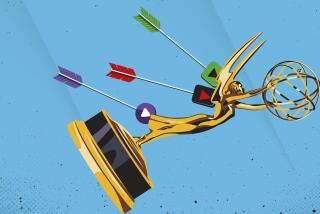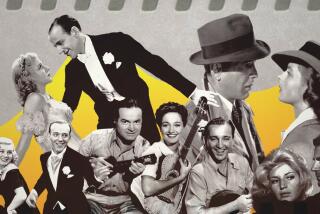Remember, TV is about intimacy
- Share via
In the beginning, the TV picture was small and fuzzy and black-and-white. Looking good was not the medium’s main concern -- to be seen at all was the point. The production values of “The Honeymooners,” one of the funniest shows television has ever produced, were approximately that of a vaudeville sketch. If Jackie Gleason had ever tripped, the whole Kramden apartment would have come down around him.
As if to emphasize the fact that television was not cinema, movies got bigger and more colorful after television came along. But then color came to TV, and the small screen got bigger too, and the picture got sharper, and the sound split into stereo. Over the last decade or two, a lot of effort has gone into making a date with television look and feel like a trip to the movies. Naturally, it became more expensive to produce.
But bigger isn’t always better. (Sometimes it’s just the bad made really big.) Television is at heart about intimacy and economy, about doing more with less. I don’t mean just the familiar cheap recourse to overhead-cutting game shows and reality series that put a few more kopecks in the network coffers. I mean that it is best at communicating small things, person to person. It is a medium of talking heads and two-shots. It thrives not on spectacle but on conversation.
As mass-market entertainment goes, TV is unusually well positioned to survive hard times. People will watch it, because it’s free, more or less, and they will especially watch it when they’re out of work. Remaining the world’s favorite waste of time, it will not be without sponsors. But if the soap and car and drug companies were to reduce their advertising because people were buying less soap and fewer cars and pioneering new horizons in self-medication, it still has a recourse. It can go back to its roots.
I don’t mean that it should be small, fuzzy and black-and-white again, only that executives and producers and creative people should treat it as if it were. (And take pay cuts reflecting whatever downturn might turn up.) It’s not as if the best ideas come from the richest networks anyway. As when French New Wave filmmakers found that a shoestring budget was no impediment to creating beauty or suspense, really poor television, by refocusing on what’s important -- the human touch, the great performance, the thoughtful script that needs no gussying up -- could reinvigorate, if not reinvent, the medium. Stylishness costs money; style comes free.
--
More to Read
The complete guide to home viewing
Get Screen Gab for everything about the TV shows and streaming movies everyone’s talking about.
You may occasionally receive promotional content from the Los Angeles Times.







